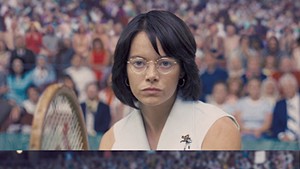As a horror fan, I'm always fascinated by the rare haunted-house movie told from the haunter's perspective. Given that these films are powered by our fear of the uncontrollable unknown, the ghost's side of the story isn't likely to be that scary. It might be funny, like Beetlejuice; or sentimental, like Ghost. Or, like writer-director David Lowery's A Ghost Story, it might be chilling in a deeper, more lasting way than we expect.
Make no mistake: This is no horror film. Lowery (Ain't Them Bodies Saints, Pete's Dragon) firmly establishes it as art-house material with an early scene in which he keeps the camera on Rooney Mara for five straight minutes as she devours a pie.
There is an emotional rationale for this audience endurance test: Mara's unnamed character has just lost her significant other (Casey Affleck) to an accident. As she destroys the poor pastry with grief-driven fork jabs, his ghost stands in the background of the shot, observing.
We know Affleck's character has become a ghost because he wears a white sheet with eyeholes cut in it. By allowing us to chuckle at this dime-store visualization of the supernatural, the film somehow reminds us how inadequate and unscary even the most expensive CG apparitions are.
Being a ghost, we learn, is boring. It's interminable, like that pie scene. It's frustrating — as, unlike Patrick Swayze's character, this ghost has no reliable means to communicate with his beloved. All he can do is watch her go through her daily routines, occasionally knocking something off a shelf in the hopes of reminding her not to move on too soon.
The dehumanizing blankness of that grubby sheet with its empty eyeholes, and the static passivity it imposes, could be read in many ways — for instance, as a metaphor for depression. Visually, though, the drapery begins to take on oddly numinous qualities. Cinematographer Andrew Droz Palermo gives it a sculptural luminosity that suggests a robed medieval mystic plunked in the suburban landscape. And when the ghost acquires what he needs most — a mission, concrete and mystical at once — the film transcends the almost comical simplicity of its premise.
A Ghost Story is so ostentatiously minimalist, like many festival-circuit films these days, that one may feel blindsided when it abruptly reveals the philosophical scope of a Terrence Malick epic. In a scene around the midpoint, an uncharacteristically verbose character (singer-songwriter Will Oldham) establishes the true stakes of our ghost's quest. Whether you love or hate the movie may hinge on whether and how his monologue resonates with you.
Because, as it turns out, A Ghost Story is about more than love, grief and frenzied pie eating. It's about whether any of us has a reason to exist, pre- or post-decease. That question has already lent itself to some pretty ponderous cinematic musings. By contrast, the twisted brilliance of this film is that Lowery sends existential dread sneaking up on us, clothing towering doubts in the harmless, negligible shape of whimsy.
A Ghost Story is a dreamlike vision of the afterlife — and, perhaps, of life — more unsettling than any of the well-timed jump scares in The Conjuring. It's terrifying for the same reason it's sometimes boring: because the ghost has run out of story. When he endures anyway, holding out for a final shred of meaning, is his persistence a powerful affirmation, or just a cosmic joke? That unanswered question could give the movie an afterlife of its own.










Comments
Comments are closed.
From 2014-2020, Seven Days allowed readers to comment on all stories posted on our website. While we've appreciated the suggestions and insights, right now Seven Days is prioritizing our core mission — producing high-quality, responsible local journalism — over moderating online debates between readers.
To criticize, correct or praise our reporting, please send us a letter to the editor or send us a tip. We’ll check it out and report the results.
Online comments may return when we have better tech tools for managing them. Thanks for reading.